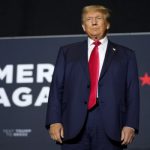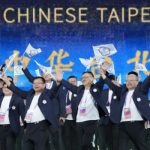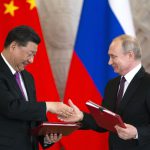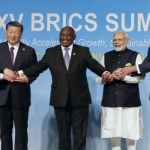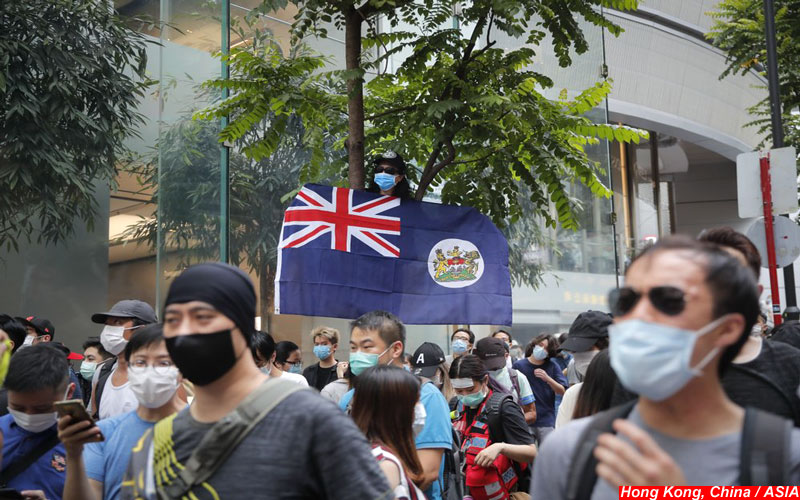
LONDON (AP) — Britain announced Wednesday that it was extending residency rights for up to 3 million Hong Kongers eligible for the British National Overseas passport, stressing that it would uphold its historic duty to the former British colony after Beijing imposed a sweeping new national security law in the city.
Foreign Secretary Dominic Raab told lawmakers that amid widespread concerns about Beijing’s tightening grip on Hong Kong, the U.K. was changing its immigration rules to give people who are connected to Britain by virtue of the city’s status as a former British colony a special route to citizenship.
Eligible individuals from Hong Kong currently can come to the U.K. for six months without a visa. Under the new policy, they will have the right to live and work in the country for five years. After that, they will be allowed to apply for settled status and then again for citizenship.
Hong Kongers who were born after the end of British rule in 1997 are not eligible, meaning that in effect, many of the city’s young student activists who are most at risk of arrest under the new law cannot take advantage of the British offer.
The announcement came hours after China imposed a sweeping new national security law in Hong Kong that Britain calls a flagrant breach of China’s international obligations and a “clear and serious violation” of the Sino-British Joint Declaration.
That treaty paved the way for Hong Kong’s handover from British to Chinese rule in 1997, and was supposed to guarantee at least 50 years of Western-style rule of law and civil liberties for the city under a “One Country, Two Systems” principle until 2047.
Chinese officials have in the past referred to the treaty as a “historical document,” a claim that Britain strongly rejects.
“The prime minister and the government are crystal clear that the United Kingdom will keep its word,” Raab said. “We will live up to our responsibilities to the people of Hong Kong.”
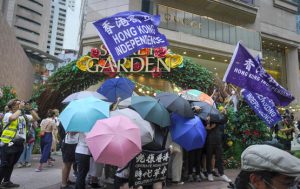
The U.K. introduced a special, limited type of British nationality in the 1980s for people who were a “British dependent territories citizen by connection with Hong Kong.” The passports did not confer nationality or the automatic right to live and work in Britain, but entitled holders to consular assistance from U.K. diplomatic posts.
Britain’s government estimates there are about 350,000 current holders of the British National Overseas passports, with a total of around 2.9 million people eligible for it. It says the extended residency rules will apply to all of them and their immediate dependents.
No exact date was given for the new rule’s implementation, and Raab said further details will be announced later.
The Foreign Office on Wednesday summoned Liu Xiaoming, the Chinese ambassador, to a meeting with permanent secretary Simon McDonald, who made clear Britain’s concern about the security law.
Raab called the security law a “grave and deeply disturbing step,” and told Parliament that it contained measures that directly threaten the judicial independence and freedoms of speech and protest protected by the Joint Declaration. It was particularly concerning that mainland Chinese authorities can now take jurisdiction over some cases without independent oversight, and try those cases in Chinese courts, he said.
Trust in China’s ability to live up to its international responsibilities took “a big step backwards,” he added.
The security law makes secessionist, subversive, terrorist activities and foreign intervention in Hong Kong’s affairs illegal. The most serious offenders, such as those deemed to be masterminds behind the crimes, could receive a maximum punishment of life imprisonment.
Many critics in the city and abroad say the law effectively ends “One Country, Two Systems” policy and erases the legal firewall between Hong Kong and the mainland’s Communist Party rule.
Hong Kong police arrested 10 people under the law Wednesday, the first day it came into effect. They included a man with a Hong Kong independence flag and a woman holding a sign displaying the British flag and calling for Hong Kong’s independence. Others were detained for possessing items advocating independence.
____
Newsroom | theworldmail.co.uk
Source/Contribution/Photo Credit by Associated Press


